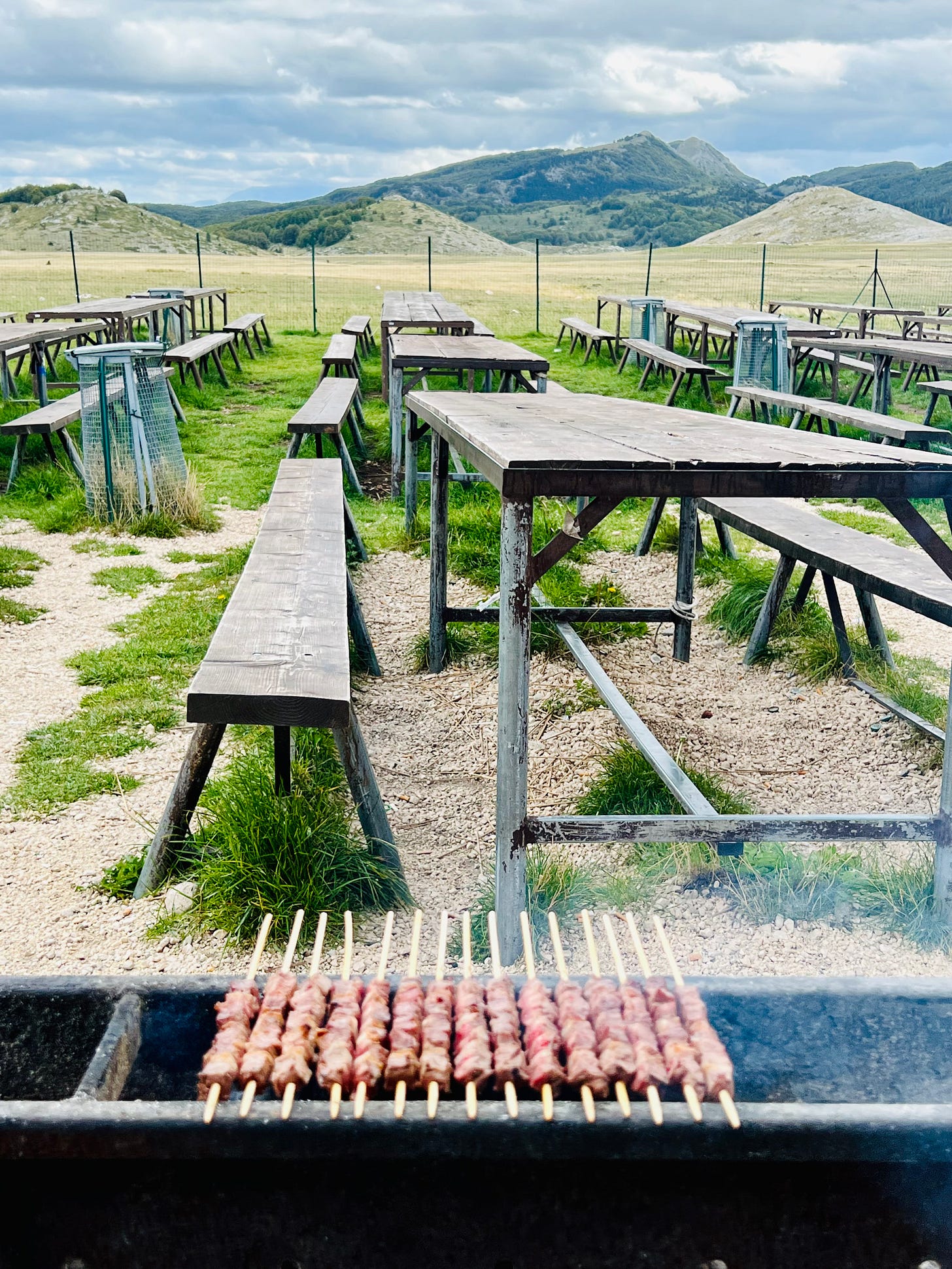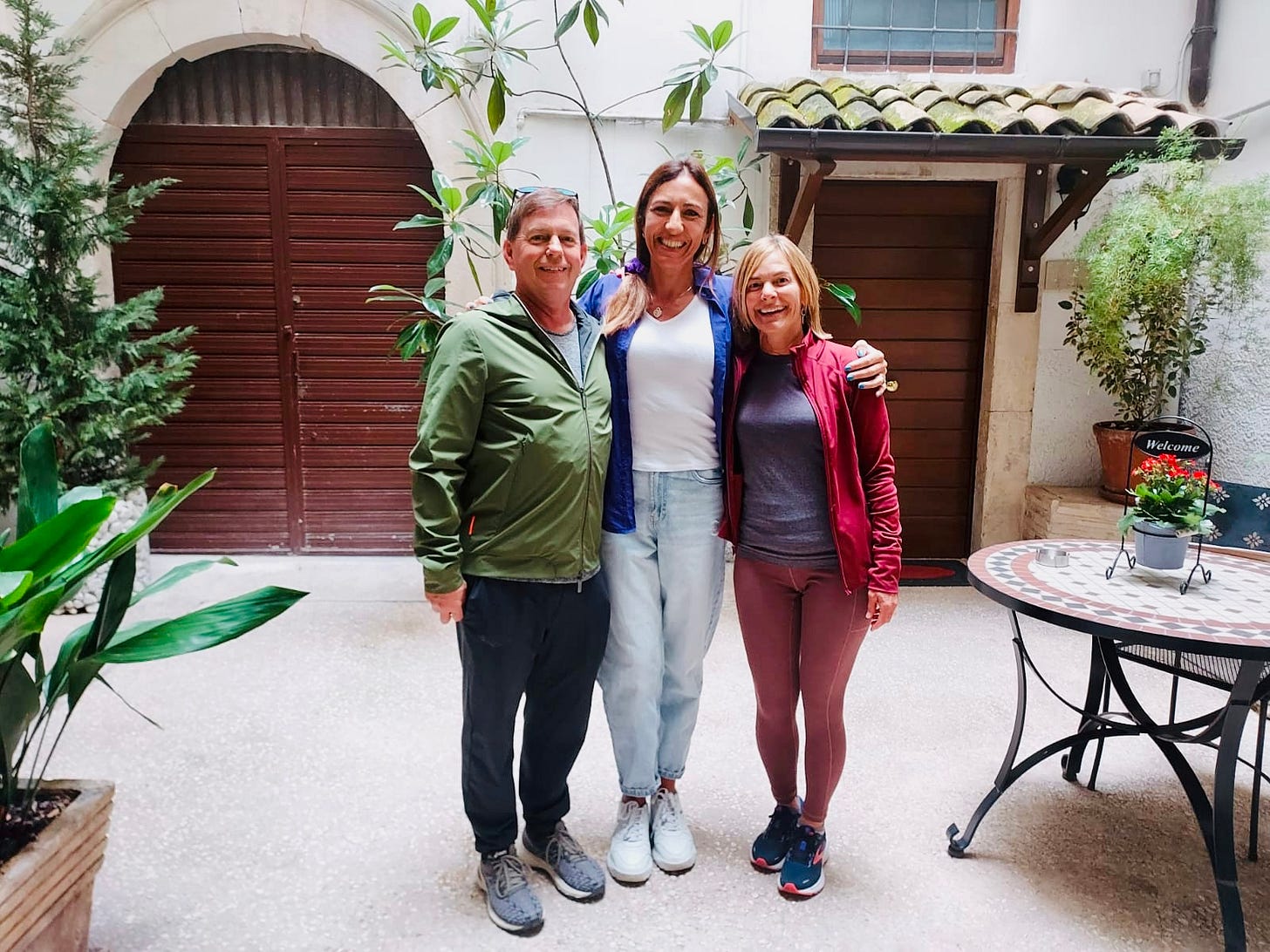With our car rental in Roma complete, I drove for about 130 km on Lazio’s autostrada, tired after the cross-Atlantic flight and inhaling recycled airplane air. I wanted to breathe in fresh Italian breezes—once you breathe it, you commit to it—and I wanted a break.
Mark checked out a page I tagged in my notes about Abruzzo, turned to Alba Fucens, a small town with a pizza joint and few intriguing ruins. In the driver’s seat, I inched the car off the autostrada ramp and toward a ticket machine lane that read Speedpass. Twice I approached the arm. Twice, the arm didn’t raise. Forced to backup to the tune of a honking, irate driver, Mark and I argued. It’s good to argue in Italy. You know you’ve adopted the passion of the people if you’re doing so. Our exchange went somewhat like every other couple that has fought over directions: What are you going to do? Back up. How can you do that? Watch me. Now what? I’ll park the car. Here? Yes, then I’ll ask that guy over there what to do.
At that time of day, the off ramp was little used. A 40ish bored looking man, fumare una sigaretta, leaned into a nearby guard rail. My heart raced. Parli inglese? No. So began my official lessons using Italian AND my hands. No ho un biglietto. Per che? Per che, ho pensato che nostra macchina noleggio ha Speedpass, ma no. (I thought our rental had Speedpass, but no). Come passiamo per la linea? (how do we pass through the “line” was my translation for lane). Through hand gestures and mentions of spingi bottone rosso, aspetta per l’uomo to (do something), and metti tessera, we were on our way, a loving couple once more, headed into the abyss of Abruzzo.
Two weeks later, I returned home. The most consistent and insistent question asked of me, was, “What was your favorite place?” Dappertutto. Everywhere, even the scene above.
I’ve traveled to my “home” country of Italy several times over the course of my life, with parents, with children, with my husband. We’ve checked off a number of “must see, must do’s” that accompany any voyage.
Though when researching the Abruzzo area, I discovered few books available for me as reference on “can’t miss.” No Rick Steves. No Stanley Tucci food shows to watch. I consumed podcasts like a kid hungry for her mother’s cooking, making lists, asking my genealogy contact for ideas, which I would later ignore hers and my own advice. I did look up surnames of my grandparents for any related businesses and found Macelleria Guliani Ristoro in the vicinity of a planned hike. Spoiler alert, we never ate there. Following our climb, the ristoro across the street hit all the taste buds in my discovery of a pecorino spalmabile, a spreadable pecorino we lathered on bread toasted over hot coals, the same over which we roasted arrosticini or spiedini (mutton skewers) and carciofo (artichokes).
Entering the territory of family is like entering into a conversation with a fine wine. You want to know the makers, the people who have crafted you and your family, raised you up from your roots. You want to know their practices and processes, the terrain over which their feet traveled for many years to form you. And you want to understand what’s inside and underneath the terra, the land. You want your fingers and toes to touch everything. Whatever they cannot touch, your nose, ears and tongue will.
“There’s nothing to do except for to be.” I said, under my breath over and over while we covered the region by car, bike, and foot.
That wasn’t really true. However, crypts of saints did not interest me, nor did the path of the invasive Saracens. The dreaded Saracens had been everywhere anyhow. There were more ancient lessons contained in one collina (hill) of Italy than in the rest of the world combined possibly. Eating does count as something to do, but it’s also a state in which one exists.
I wanted to toss off those feelings of never being enough. I wanted to be more. Or become more—of myself. Which I did, by gaining a few pounds. Despite the added heft, my spirit began started to lighten. For that to happen, it was required of me to be present. I would not have done so in the middle of truffle hunting (we eschewed groups and tours, yet I welcomed truffles to my palate), but when our guide asked if I wanted to hike along the dry riverbed in the Campo Imperatore or climb to the mountain’s shoulder for a windy view of the Adriatic, I chose to reach for the heights.
Why did I rip myself away from my roots for those two weeks? Travel, and in particular, a new environment, boosts our brain cells, so does learning a new language, and living deeply within that language. Author Jhumpa Lahiri wrote a book about writing in Italian, In Other Words, in which she pushed herself to her limits, swimming all the way across the lake and not at the edges. Actor Michael Tucker and his wife rekindled their love for Italy in a memoir titled, Living in a Foreign Language. If I were to pen a memoir of my very short two weeks, I would title it, Nothing to Do But to Be. I wanted a place to simply be.
What were my favorite places, the instances I will hold close? Trying to find some familiar note in the lines of my cousins’ faces. Our guide suggesting we had extra time in our schedule, would we like to visit his palazzo under renovation that had been featured on a TV show called Help I Bought an Italian Village. Or our plan to stroll the streets of Sulmona only to find out there’s una corsa della città dedicated to Ovid, the town’s famous son. Only in Italy would they have a 10K run dedicated to a poet. To art and artists. To life.
Walking along the old walls of Rosciano in the evening, waiting until the appointed 8 p.m. when the only restaurant in town, Gran Torre, opened, we picked at olives on an estate for sale to see if they were ready for harvest, and marveled at the luminous, numerous fig trees that grew wild. We entered the ristorante and cheered for the Roma-Atalanta soccer match with the locals, never knowing which side they wanted to win. Speaking with our proprietaria, Francesca, about how she inherited her palazzo from her mother, who stayed bedridden during our time there. Saying “yes” always to laid-that-morning uova strapazzate (scrambled eggs).
The everyday sights and sounds most of us miss, including the sign we didn’t notice along a pista di bicicletta which caused us to bike alongside cars on the autostrada and added a few too many miles to our cycling journey, the final ascent to our hotel that night, walking an e-bike from sea level up an unbelievably steep hill while the carabinieri whistled and rode past. The sight of a leaning shepherd’s crook holding up a shepherd talking with the cyclist, who was most likely training for the Giro d’ Italia. Driving up and down roads to Rocca Calascio, Popoli, San Benedetto in Perillis, and along curves designed for race cars. Earning my nickname, Two-lane Netti, while driving like an Italian.
My sister arrived for a visit last week. She asked to see my photos. Some she’ll never get a look at because I couldn’t take a snapshot of my insides smiling, tracking each experience as if etching it onto a vinyl record I want to play over and over. Even when I’m old, and it begins to skip. My heart will recognize it, I’m sure.
“It's a kindness that the mind can go where it wishes.” Ovid writes, and I agree.
In Scanno, a town famous for its lace and lace-like jewelry, I saw the outlines of my mother’s doilies and grandmother’s tatting everywhere. Maybe that’s it. Like scouting out the best pizzelle (another spoiler: my mother’s were still the best), whether in gelato or cut into a heart shape, we see our forebears in the patterns of their handiwork, in the same way we see the likenesses in the people. After we parked the car, Mark said, “That woman looked like your mother, in some of the photos when she was younger.” I searched for that woman, her scarf, in the small town that rolled up its shutters for lunch, at every stone corner and path. The only place I found her was in the scent of burnt sugar from a pasticeria down a little set of darkened steps. I bought three cookies, mandorla (almond) flavored and found an essence of her in those savored bites. We returned to the palazzo, where the proprietaria, Marta, greeted us with her round, shiny face and wide smile, again reminiscent of someone else I loved.
We travel to find something familiar in us. We also launch ourselves into the new lands to explore that piece of us that’s unknown, the one that originated in distant lands or peoples, and was carried across the sea to live inside of my mother, me, my siblings, and now inside my son, and possibly my husband, who willingly dragged himself along.
What were my favorite memories? Ogni piccolo cosa (every little thing).
The meals we didn’t plan for, shopping at a supermarket late at night, and buying a bag of taralli that would carry me through the relentlessly dizzying turns of the autostrada into Pacentro and Sulmona. Stopping for aperitivi and deciding the Romans had a leg up on the Napoletana pizza because they make a pinsa dough infinitely more tasty and light, and contains less gluten. Eating more beans, lenticchie, fagioli, cici, because they are as ancient as the Iliad. Italians are so much more than bread and wine. In Scanno, asking the gioielliere (jeweler) how much for the agnello, instead of anello, and remembering that agnello is lamb, and not ring. A day later, I would eat plenty of agnello vecchio (old lamb) in the arrosticini.
Andrew Sean Greer, author of Less, says, “I read every graffiti in every bathroom. That makes where I am a real place, that I’m actually in the world.” Another way of saying I pay homage to every little thing. Stopping randomly at la spiaggia di Pineto, learning later it was our guide’s favorite beach too. Finding friends, exchanging emails, and creating bonds to circumnavigate the globe.
Sitting on rock, in a grotto hacked into a hillside centuries ago, drinking wine and eating a fresh, homemade panzanella lunch, contemplating every little thing in the same way San Bartolomeo in Legio did in his eremo (hermitage) in Roccamorice. Though his focus was solely on faith, certainly San Bartolomeo thought, as I did. All this Italian air is mine to behold.
Thanks for reading. Upcoming workshops can be found in my previous blog. As for next time, I have a little bit more to say about my travels. Italians always have a little bit more to say.








Makes me want to go to Italy and see some of the "finds" you found. Great read, almost felt like I was there with you
Oh loved your adventure. Only you can bring forward what I would love to search. What an exciting time. I have been to Italy and it is beautiful. I picture the places where I visief with about 30 other people. Oh Annette so beautiful and exciting. Once in a lifetime a dream come true. 💕❤️